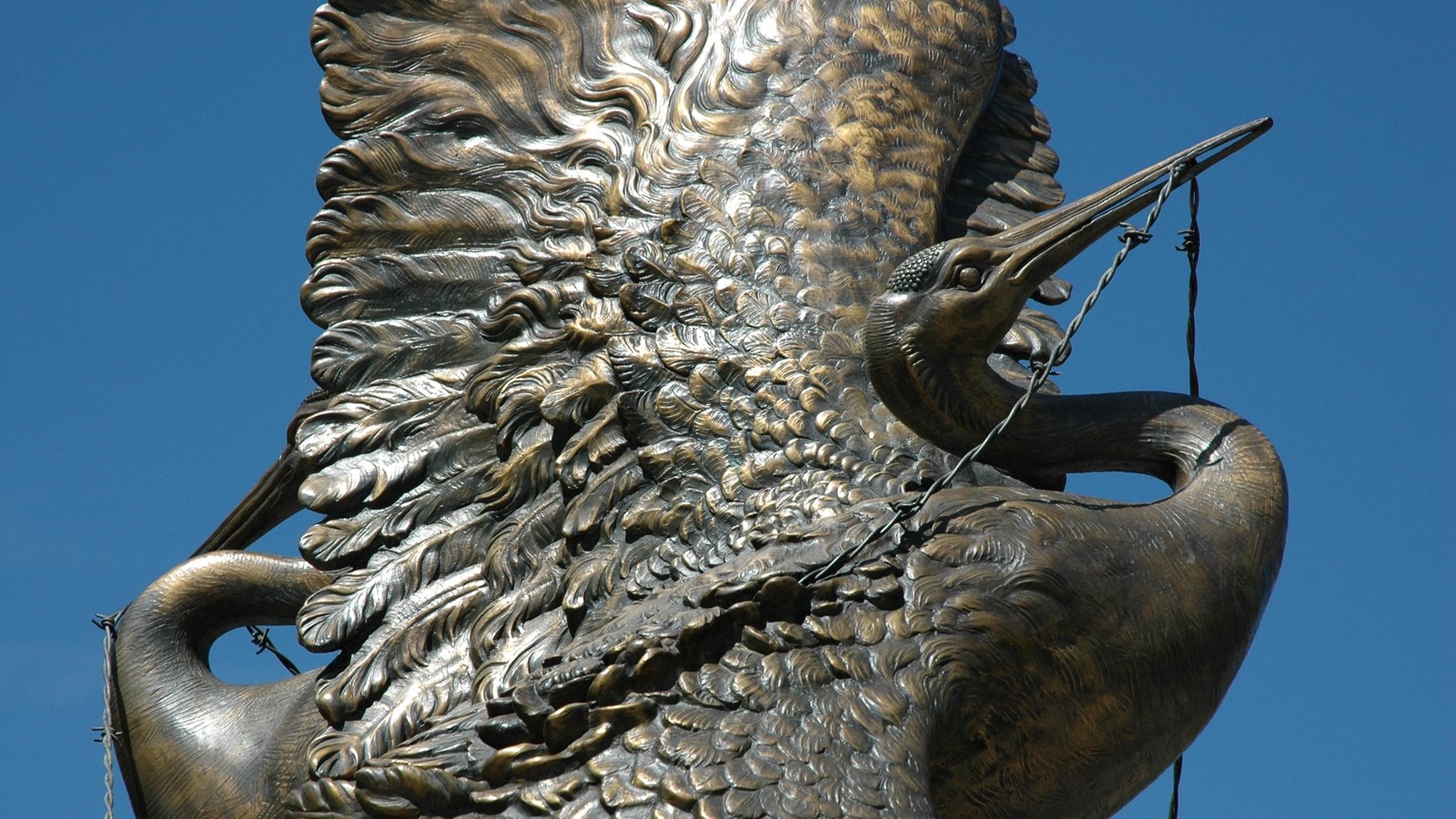Last updated: July 23, 2025
Place
Japanese American Memorial to Patriotism During World War II

Historical/Interpretive Information/Exhibits, Public Transit
The Japanese American Memorial to Patriotism During World War II honors Japanese Americans who lived in incarceration camps and those who served in the US military during WWII.
Located just north of the U.S. Capitol at the intersection of New Jersey Ave. & D. St NW, this memorial reflects on the legacy of Japanese incarceration camps in the United States during World War II. Many Japanese Americans were treated with suspicion and as potential spies, and were sent to incarceration camps, in many cases for several years, to sit out the war because of their race, not because of any actual espionage. As a result, many were displaced and were never able to return home when the war ended.
The memorial incorporates symbolism such as a zen garden motif, but the most striking feature may be the bronze sculpture of Japanese cranes entangled in barbed wire.
Inscriptions
Pool edge
"Here we admit a wrong. Here we affirm our commitment as a nation to equal justice under the law."
President Ronald W Reagan Upon Singing the Civil Liberties Act 1988
Left wall
"May this memorial be a tribute to the indomitable spirit of a citizenry in World War II who remained steadfast in their faith in our democratic system."
Norman Y. Mineta, internee at Heart Mountain, Wyoming.
"I am proud that I am an American
of Japanese ancestry.
I believe in this nation's
institutions, ideals and traditions.
I glory in her heritage.
I boast of her history.
I trust in her future."
Mike M. Masaoka, civil rights advocate, staff sergeant at 442nd Regimental Combat Team.
"Our actions in passing the Civil Liberties Act of 1988 are essential for giving credibility to our constitutional system and reinforcing our tradition of justice."
Robert T Matsui, internee at Tule Lake.
Right wall
On February 19, 1942, 73 days after the United States entered World War II, President Franklin D. Roosevelt issued Executive Order 9066 which resulted in the removal of 120,000 Japanese American men, women and children from their homes in the western states and Hawaii.
Allowed only what they could carry, families were forced to abandon homes, friends, farms and businesses to live in ten remote relocation centers guarded by armed troops and surrounded by barbed wire fences. Some remained in the relocation centers until March 1946.
In addition 4,500 were arrested by the Justice Department and held in incarceration camps, such as Santa Fe, New Mexico. 2,500 were also held at the family camp in Crystal City, Texas.
Answering the call of duty, young Japanese Americans entered into military service, joining many pre-war draftees. The 100th infantry battalion and 442nd regimental combat team, fighting in Europe, became the most highly decorated army unit for its size and length of service in American Military History. Japanese Americans in the Military Intelligence Service used their bilingual skills to help shorten the war in the Pacific and thus saved countless American lives. The 1399th Engineer Construction Battalion helped fortify the infrastructure essential for victory.
In 1983, almost forty years after the war ended, the federal Commission on Wartime Relocation and Internment of Civilians found that there had been no military necessity for the mass imprisonment of Japanese Americans and that a grave injustice had been done.
In 1988 President Ronald W. Reagan signed the Civil Liberties Act which made an apology for the injustice, provided minimal compensation and reaffirmed the nation's commitment to equal justice under the law for all Americans.
Rear wall
[this information refers to the name of the camp, the number of people incarcerated, and the state in which it was located]
POSTON
17,814
ARIZONA
~~~
HEART MOUNTAIN
10,767
WYOMING
~~~
TOPAZ
8,130
UTAH
~~~
JEROME
8,497
ARKANSAS
~~~
MANZANAR
10,046
CALIFORNIA
~~~
ROHWER
8,475
ARKANSAS
~~~
TULE LAKE
18,789
CALIFORNIA
~~~
MINIDOKA
9,397
IDAHO
~~~
GILA RIVER
13,348
ARIZONA
~~~
AMACHE
7,318
COLORADO
Rear wall
"Japanese by Blood
Hearts and Minds American
With Honor Unbowed
Bore the Sting of Injustice
For Future Generations"
Tanka poem, a classical form of Japanese poetry, written by Akemi Dawn Matsumoto Ehrlich
"We believed a threat to this nation's democracy was a threat to the American dream and to al free peoples of the world."
Spark M. Matsunaga US Congressman, US Senator, Captain 100th Infantry Battalion
Rear wall, names
Five panels of names, registry at https://www.njamemorial.org/remember
Here we honor those who died in service during World War II
Rear wall
"You fought not only the enemy but you fought prejudice - and you won. Keep up that fight and we will continue to win to make this great republic stand for what the constitution says it stands for. The welfare of all the people all of the time."
President Harry S. Truman 1946 White House Ceremony for the 100th Infantry Battalion and 442nd Regimental Combat Team
"The lessons learned must remain as a grave reminder of what we must not allow to happen again to any group."
DANIEL K. INOUYE U.S. Congressman U.S. Senator
Captain 42nd Regimental Combat Team
